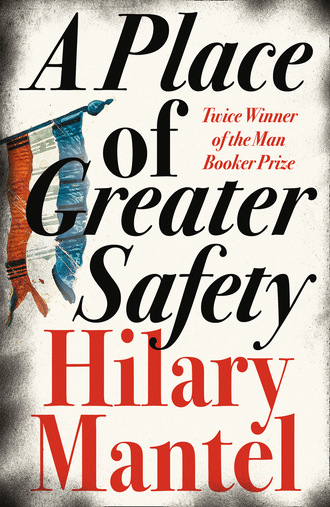
Полная версия
A Place of Greater Safety
He liked her voice, her foreign accent; wanted to keep her talking. ‘Where are you from?’
‘Near Liège. I’ve – well – travelled a bit.’ She put her cheek on her hand. ‘My name is Anne Théroigne.’ She closed her eyes. ‘God, I’m so tired,’ she said. She moved thin shoulders inside the shawl, trying to ease the world off her back.
AT THE RUE CONDÉ, Claude was at home. ‘I’m surprised to see you,’ he said. He didn’t look it. ‘You’ve had your answer,’ he said. ‘Positively no. Never.’
‘Immortal, are you?’ Camille said. He felt just about ready for a fight.
‘I could almost believe you’re threatening me,’ Claude said.
‘Listen to me,’ Camille said. ‘Five years from now there will be none of this. There will be no Treasury officials, no aristocrats, people will be able to marry who they want, there will be no monarchy, no Parlements, and you won’t be able to tell me what I can’t do.’
He had never in his life spoken to anyone like this. It was quite releasing, he thought. I might become a thug for a career.
Annette, a room away, sat frozen in her chair. It was only once in six months that Claude came home early. It followed that Camille could not have prepared for him; this was all out of his head. He wants to marry my daughter, she thought, because someone is telling him he can’t. And she had for years nourished this rare and ferocious ego in her own drawing room, feeding it like some peculiar house-plant on mocha coffee and small confidences.
‘Lucile,’ she said, ‘sit in your chair, don’t dare leave this room. I will not condone your flouting your father’s authority.’
‘You mistake that for authority?’ Lucile said. Frightened, she walked out of the room. Camille was white with anger, his eyes opening like dark, slow stains. She stood in his path. ‘You must know,’ she said, to anyone it concerned, ‘I mean to have another life from the one they’ve worked out for me. Camille, I’m terrified of being ordinary. I’m terrified of being bored.’
His fingertips brushed the back of her hand. They were cold as ice. He turned on his heel. A door slammed. She had nothing left of him but the small chilled islands of skin. She heard her mother crying noisily out of sight, gasping and gagging. ‘Never,’ her father said, ‘never in twenty years has there been a word said out of place in this house, there have been none of these upsets, my daughters have never heard voices raised in anger.’
Adèle came out. ‘So now we are living in the real world,’ she said.
Claude wrung his hands. They had never seen anyone do it before.
THE D’ ANTONS’ son was a robust baby, with a brown skin, a full head of dark hair, and his father’s eyes, surprisingly light blue. The Charpentiers hung over the crib, pointing out resemblances and saying who he would be. Gabrielle was pleased with herself. She wanted to feed the baby herself, not send him off to a wet-nurse. ‘Ten years ago,’ her mother said, ‘that would have been quite unthinkable for a woman in your position. An advocate’s wife.’ She shook her head, disliking modern manners. Gabrielle said, perhaps some changes are for the better? But apart from this one, she could not think of any.
We are now in May 1788. The King has announced that he will abolish the Parlements. Some of their members are under arrest. Receipts are 503 million, expenditure is 629 million. Out in the street, one of the local pigs pursues a small child, and jumps on it under Gabrielle’s window. The incident makes her feel queasy. Since she gave birth, she does not wish to view life as a challenge.
So they moved on quarter day, to a first-floor apartment on the corner of the rue des Cordeliers and the Cour du Commerce. Her first thought was, we cannot afford this. They needed new furniture to fill it; it was the house of an established man. ‘Georges-Jacques has expensive tastes,’ her mother said.
‘I suppose the practice is doing well.’
‘This well? My dear, I’ve always enjoined obedience in you. But not imbecility.’
Gabrielle said to her husband, ‘Are we in debt?’
He said, ‘Let me worry about that, will you?’
Next day, at the front door of the new house, d’Anton stopped to admit before him a woman holding by the hand a little girl of nine or ten. They introduced themselves. She was Mme Gély, her husband Antoine was an official at the Châtelet court, M. d’Anton might know him? He did. And the baby, your first? And this is Louise – yes, I’ve just the one – and pray Louise, do not scowl, do you want your face to set like that? ‘Please tell Mme d’Anton that if she wishes any help, she has only to ask. Next week, when you are settled, do come to supper.’
The child Louise trailed after her as she walked upstairs. She gave d’Anton a backward glance.
He found Gabrielle sitting on a packing case, fitting together the halves of a dish. ‘This is all we’ve broken,’ she said. She jumped up and kissed him. ‘Our new cook is cooking. And I’ve engaged a maid this morning, her name’s Catherine Motin, she’s young and quite cheap.’
‘I’ve just met our upstairs neighbour. Very mincing and genteel. Got a little girl, about so high. Gave me a very suspicious look.’
Gabrielle reached up and joined her hands at the nape of his neck. ‘You’re not reassuring to look at, you know. Is the case over?’
‘Yes. And I won.’
‘You always win.’
‘Not always.’
‘I can pretend that you do.’
‘If you like.’
‘So you don’t mind if I adore you?’
‘It’s a question, I’m told, of whether you can bear the dead weight of a woman’s expectations. I’m told that you shouldn’t put yourself into the position with a woman where you have to be right all the time.’
‘Who told you that?’
‘Camille, of course.’
The baby was crying. She pulled away. This day, this little conversation would come back to him, years on: the new-born wails, her breasts leaking milk, the sweet air of inconsequentiality the whole day wore. And the smell of polish and paint and the new carpet: a sheaf of bills on the bureau: summer in the new trees outside the window.
Price inflation 1785–1789:
Wheat 66% Rye 71% Meat 67% Firewood 91%STANISLAS FRÉRON was an old schoolfriend of Camille’s, a journalist. He lived around the corner and edited a literary periodical. He made waspish jokes and thought too much about his clothes, but Gabrielle found him tolerable because he was the godson of royalty.
‘I suppose you call this your salon, Mme d’Anton.’ He dropped into one of her new purple armchairs. ‘No, don’t look like that. Why shouldn’t the wife of a King’s Councillor have a salon?’
‘It’s not the way I think of myself.’
‘Oh, I see, it’s you that’s the problem, is it? I thought perhaps we were the problem. That you saw us as second-rate.’ She smiled politely. ‘Of course, some of us are second-rate. And Fabre, for instance, is third-rate.’ Fréron leaned forward and made a steeple out of his hands. ‘All those men,’ he said, ‘whom we admired when we were young, are now dead, or senile, or retired into private life on pensions that the Court has granted them to keep the fires of their wrath burning low – though I fear it was simulated wrath in the first place. You will remember the fuss there was when M. Beauharnais wanted to have his plays performed, and how our fat, semi-literate King banned them personally because he considered them subversive of the good order of the state; it proved, didn’t it, that M. Beauharnais’s ambition was to have the most opulent town-house in Paris, and now he is building it, within sight of the Bastille and within smell of some of the nastiest tenements of the city. Then again – but no, I could multiply examples. The ideas that were considered dangerous twenty years ago are now commonplaces of establishment discourse – yet people still die on the streets every winter, they still starve. And we, in our turn, are militant against the existing order only because of our personal failure to progress up its sordid ladder. If Fabre, for example, were elected to the Academy tomorrow, you would see his lust for social revolution turning overnight into the most douce and debonair conformity.’
‘Very nice speech, Rabbit,’ d’Anton said.
‘I wish Camille would not call me that,’ Fréron said with controlled exasperation. ‘Now everyone calls me that.’
D’Anton smiled. ‘Go on,’ he said. ‘About these people.’
‘Well then … have you met Brissot? He’s in America just now, I think, Camille had a letter. He is advising them on all their problems. A great theorist is Brissot, a great political philosopher, though with scarcely a shirt to his back. And all these professional Americans, professional Irishmen, professional Genevans – all the governments in exile, and the hacks, scribblers, failed lawyers – all those men who profess to hate what they most desire.’
‘You can afford to say it. Your family is favoured, your paper’s on the right side of the censors. A radical opinion is a luxury you may allow yourself.’
‘You denigrate me, d’Anton.’
‘You denigrate your friends.’
Fréron stretched his legs. ‘End of argument,’ he said. He frowned. ‘Do you know why he calls me Rabbit?’
‘I can’t imagine.’
Fréron turned back to Gabrielle. ‘So, Mme d’Anton, I still believe you have the makings of a salon. You have me, and François Robert and his wife – Louise Robert says she would write a novel about Annette Duplessis and the rue Condé débâcle, but she fears that as a character in fiction Camille would not be believed.’
The Roberts were newly married, soddenly infatuated with each other, and horribly impoverished. He was twenty-eight, a lecturer in law, burly and affable and open to suggestions. Louise had been Mlle de Kéralio before her marriage, brought up in Artois, daughter of a Royal Censor; her aristocratic father had vetoed the match, and she had defied him. The weight of the family displeasure left them with no money and all routes of advancement barred to François; and so they had rented a shop in the rue Condé and opened a delicatessen, specializing in food from the colonies. Now Louise Robert sat behind her till turning the hems of her dresses, her eyes on a volume of Rousseau, her ears open for customers and for rumours of a rise in the price of molasses. In the evening she cooked a meal for her husband and laboriously checked the day’s accounts, her haughty shoulders rigid as she added up the receipts. When she had finished she sat down and chatted calmly to François of Jansenism, the administration of justice, the structure of the modern novel; afterwards she lay awake in the darkness, her nose cold above the sheets, praying for infertility.
Georges-Jacques said, ‘I feel at home here.’ He took to walking about the district in the evening, doffing his hat to the women and getting into conversation with their husbands, returning on each occasion with some fresh item of news. Legendre the master butcher was a good fellow, and in a profitable line of business. The rough-looking man who lived opposite really was a marquis, the Marquis de Saint-Huruge, and he has a grudge against the regime; Fabre tells a tremendous story about it, all about a misalliance and a lettre de cachet.
It would be quieter here, Georges-Jacques had said, but the apartment was constantly full of people they half-knew; they never ate supper alone. The offices were on the premises now, installed in a small study and what would otherwise have been their dining room. During the day the clerks Paré and Deforgues would drift in to talk to her. And young men she had never seen before would come to the door and ask her if she knew where Camille lived now. Once she lost her temper and said, ‘As near as makes no difference, here.’
Her mother came over once or twice in the week, to cluck over the baby and criticize the servants and say, ‘You know me, Gabrielle, I’d never interfere.’ She did her own shopping, because she was particular about vegetables and liked to check her change. The child Louise Gély came with her, to pretend to help her carry her heavy bags, and Mme Gély came to advise her about the local shopkeepers and pass comments on the people they met in the streets. She liked the child Louise: open-faced, alert, wistful at times, with an only-child’s precocity.
‘Always so much noise from your place,’ the little girl said. ‘So many ladies and gentlemen coming and going. It’s all right, isn’t it, if I come down sometimes?’
‘As long as you’re good and sit quietly. And as long as I’m there.’
‘Oh, I wouldn’t think of coming otherwise. I’m afraid of Maître d’Anton. He has such a countenance.’
‘He’s very kind really.’
The child looked dubious. Then her face brightened. ‘What I mean to do,’ she said, ‘is to get married myself as soon as someone asks me. I’m going to have packs of children, and give parties every night.’
Gabrielle laughed. ‘What’s the hurry? You’re only ten.’
Louise Gély looked sideways at her. ‘I don’t mean to wait until I’m old.’
ON 13 JULY there were hail-storms; to say this is to give no idea of how the hail fell – as if God’s contempt had frozen. There was every type of violence and unexplained accidents on the streets. The orchards were stripped and devastated, the crops flattened in the fields. All day it hammered on windows and doors, like nothing in living memory; on the night of the 13th to 14th, a cowed populace slept in apprehension. They woke to silence; it seemed so long before life flowed through the city; it was hot, and people seemed dazed by the splintered light, as if all France had been pushed under water.
One year to the cataclysm: Gabrielle stood before a mirror, twitching at her hat. She was going out to buy some lengths of good woollen stuff for Louise’s winter dresses. Mme Gély would not contemplate such a fool’s errand, but Louise liked her winter clothes in her wardrobe by the end of August; who knew what the weather would do next, she asked, and if it should suddenly turn chilly she would be stranded, because she had grown so much since last year. Not that I go anywhere in winter, she said, but perhaps you will take me to Fontenay to see your mother. Fontenay, she said, is the country.
There was someone at the door. ‘Come in, Louise,’ she called, but no one came. The maid Catherine was rocking the screaming baby. She ran to the door herself, hat in hand. A girl she didn’t know stood there. She looked at Gabrielle, at the hat, stepped back. ‘You’re going out.’
‘Is there anything I can do for you?’
The girl glanced over her shoulder. ‘Can I come in for five minutes? I know this sounds unlikely, but I’m sure the servants have been told to follow me about.’
Gabrielle stepped aside. The girl walked in. She took off her broad-brimmed hat, shook out her dark hair. She wore a blue linen jacket, tight-fitting, which showed off her hand-span waist and the supple line of her body. She ran a hand back through her hair, lifted her jaw, rather self-conscious: caught sight of herself in the mirror. Gabrielle felt suddenly dumpy and badly dressed, a woman getting over a pregnancy. ‘I imagine,’ she said, ‘that you must be Lucile.’
‘I came,’ Lucile said, ‘because things are so awful and I desperately need to talk to somebody, and Camille has told me all about you, and he’s told me what a kind and sympathetic person you are, and that I will love you.’
Gabrielle recoiled. She thought, what a low, mean, despicable trick: if he’s told her that about me, how can I possibly tell her what I think of him? She dropped her hat on a chair. ‘Catherine, run upstairs and say I’ll be delayed. Then fetch us some lemonade, will you? Warm today, isn’t it?’ Lucile looked back at her: eyes like midnight flowers. ‘Well, Mlle Duplessis – have you quarrelled with your parents?’
Lucile perched on a chair. ‘My father goes around our house saying, “Does a father’s authority count for nothing?” He intones it, like a dirge. My sister keeps saying it to me and making me laugh.’
‘Well, doesn’t it?’
‘I believe in the right to resist authority when it’s wrong-headed.’
‘What does your mother say now?’
‘Nothing much. She’s gone very quiet. She knows I get letters. She pretends not to know.’
‘That seems unwise of her.’
‘I leave them where she can read them.’
‘That makes neither of you any better.’
‘No. Worse.’
Gabrielle shook her head. ‘I can’t condone it. I would never have defied my parents. Or deceived them.’
Lucile said, with passion, ‘Don’t you think women should choose who they marry?’
‘Oh yes. Within reason. It just isn’t reasonable to marry Maître Desmoulins.’
‘Oh. You wouldn’t do it then?’ Lucile looked as if she were hesitating over a few yards of lace. She picked up an inch of her skirt, ran the material slowly between her fingers. ‘The thing is, Mme d’Anton, I’m in love with him.’
‘I doubt it. You’re just going through that phase, you want to be in love with somebody.’
Lucile looked at her with curiosity. ‘Before you met your husband, were you always falling in love with people?’
‘To be honest, no – I wasn’t that sort of girl.’
‘What makes you think I am, then? All this business of going through phases, it’s just a thing that older people say, they think they have the right to look at you from their mouldy perches and pass judgement on your life.’
‘My mother, who is a woman of some experience, would say it is an infatuation.’
‘Fancy having a mother with that sort of experience. Quite like mine.’
Gabrielle felt the first stirrings of dismay. Trouble, under her own roof. How can she make this little girl understand? Can she understand anything any more, or has common sense loosened its hold for good, or did it have a hold in the first place? ‘My mother tells me,’ she said, ‘never to criticize my husband’s choice of friends. But in this case – if I tell you that with one thing and another I don’t admire him …’
‘That becomes clear.’
Gabrielle had a mental picture of herself, in the months before the baby was born, waddling about the house. Her pregnancy, delightful in its results, had been in one way a trial and embarrassment. Even by the end of the third month she’d been quite big, and she could see people sizing her up, quite unashamedly; she knew that after the birth they would count on their fingers. As the weeks passed, Georges-Jacques treated her as interesting but alien. He talked to her even less about matters not strictly domestic. She missed the café, more than he could know; she missed that undemanding masculine company, the easy talk of the outside world.
So … what did it matter if Georges always brought his friends home? But Camille was always arriving or just about to leave. If he sat on a chair it was on the very edge, and if he remained there for more than thirty seconds it was because he was deeply fatigued. A note of panic in his veiled eyes struck a corresponding note in her heavy body. The baby was born, the heaviness dispersed; a rootless anxiety remained. ‘Camille is a cloud in my sky,’ she said. ‘He is a thorn in my flesh.’
‘Goodness, Mme d’Anton,’ Lucile said, ‘are those the metaphors you feel forced to employ?’
‘To begin … you know he has no money?’
‘Yes, but I have.’
‘He can’t just live on your money.’
‘Lots of men live on women’s money. It’s quite respectable, in some circles it’s always done.’
‘And this business of your mother, that they may have been having – I don’t know how to put it.’
‘I don’t either,’ Lucile said. ‘There are terms for it, but I’m not feeling robust this morning.’
‘You must find out the truth about it.’
‘My mother won’t talk to me. I could ask Camille. But why should I make him lie to me? So I dismiss it from my mind. I regard the subject as closed. You see, I think about him all day. I dream about him – I can’t be blamed for that. I write him letters and I tear them up. I imagine that I might meet him by chance in the street –’ Lucile broke off, raised a hand, and pushed back from her forehead an imaginary strand of hair. Gabrielle watched her with horror. This is obsession, she thought, this parody of gesture. Lucile felt herself do it; she saw herself in the glass; she thought, it is an evocation.
Catherine put her head around the door. ‘Monsieur is home early.’
Gabrielle leapt up. Lucile sat back in her chair. She allowed her arms to lie along the chair’s arms, and flexed her hands like a cat testing its claws. D’Anton walked in. As he was taking off his coat he was saying, ‘There’s a mob around the Law Courts, and here I am, you told me to stay away from trouble. They’re letting off fireworks and shouting for Orléans. The Guards aren’t interested in breaking it up –’ He saw Lucile. ‘Ah,’ he said, ‘trouble has come home, I see. Camille is talking to Legendre, he will be here directly. Legendre,’ he added pointlessly, ‘is our butcher.’
When Camille appeared Lucile rose smoothly from her chair, crossed the room and kissed him on the mouth. She watched herself in the mirror, watched him. She saw him take her hands from his shoulders and return them to her gently, folded together as if in prayer. He saw how different she looked with her hair unpowdered, how dramatic were her strong features and perfect pallor. He saw Gabrielle’s hostility towards him melt a little. He saw how she watched her husband, watching Lucile. He saw d’Anton thinking, for once he did not lie, he did not exaggerate, he said Lucile was beautiful and she is. This took one second; Camille smiled. He knows that all his derelictions can be excused if he is deeply in love with Lucile; sentimental people will excuse him, and he knows how to encourage sentiment. He thinks that perhaps he is deeply in love; after all, what else is the name for the excited misery he sees on Lucile’s face, and which his own face, he feels sure, reflects?
What has put her into this state? It must be his letters. Suddenly, he remembers what Georges had said: ‘Try prose.’ At that, it might not be so futile. He has a good deal to say, and if he can reduce his complicated and painful feelings about the Duplessis household to a few telling and effective pages, it ought to be child’s play to analyse the state of the nation. Moreover, while his life is ridiculous and inept and designed to make people smile, his writing could be stylish and heartless, and produce weeping and gnashing of teeth.
For quite thirty seconds, Lucile had forgotten to look into the mirror. For the first time, she felt she had taken a hold upon her life; she had become embodied, she wasn’t a spectator any more. But how long would the feeling last? His actual physical presence, so much longed for, she now found too much to bear. She wished he would go away, so she could imagine him again, but she was unsure how to request this without appearing demented. Camille framed in his mind the first and last sentences of a political pamphlet, but his eyes did not shift from her face; as he was extremely shortsighted, his gaze gave the impression of an intensity of concentration that made her weak at the knees. Deeply at cross-purposes, they stood frozen, hypnotized, until – as moments do – the moment passed.
‘So this is the creature who oversets the household and suborns servants and clergyman,’ d’Anton said. ‘I wonder, my dear, do you know anything of the comedies of the English writer, Mr Sheridan?’
‘No.’
‘I wondered if you thought that Life ought to imitate Art?’
‘If it imitates life,’ Lucile said, ‘that’s quite exciting enough for me.’ She noticed the time on the clock. ‘I’ll be killed,’ she said.
She blew them all a kiss, swept up her feathered hat, ran out on to the stairs. In her haste she almost knocked over a small girl, who appeared to be listening at the door, and who, surprisingly, called out after her, ‘I like your jacket.’








